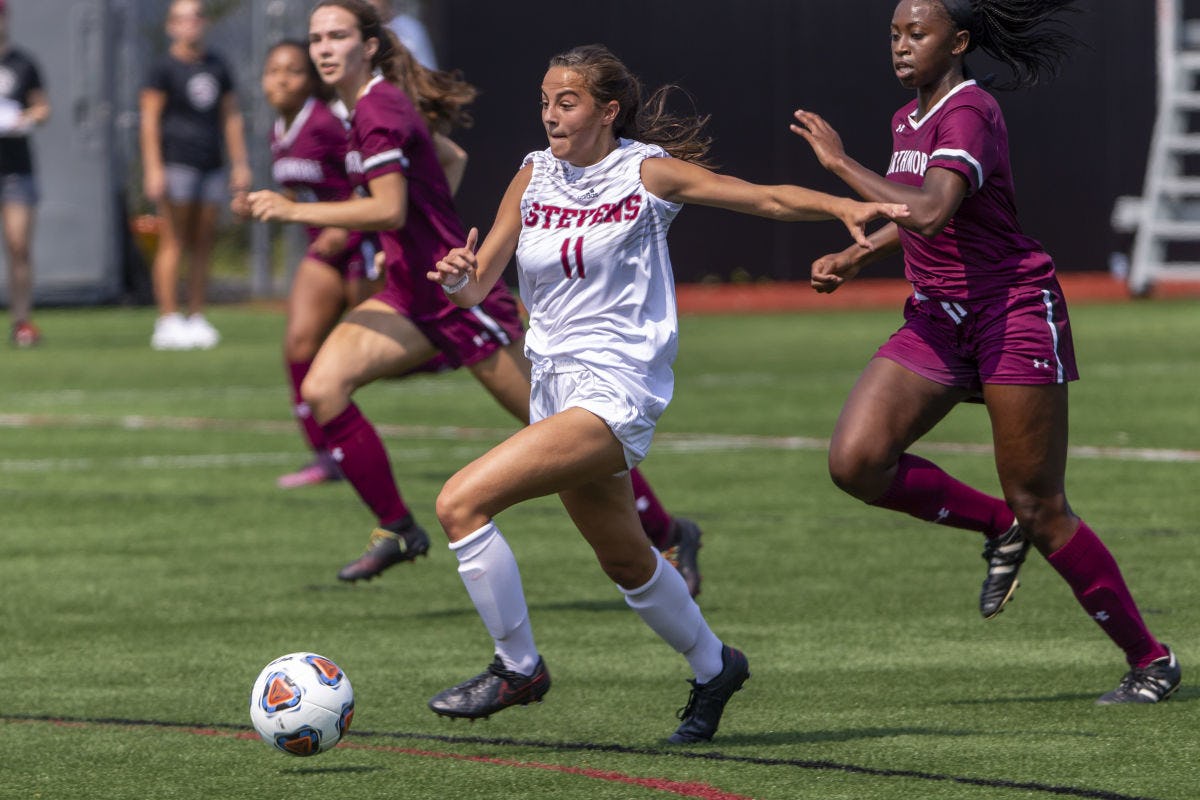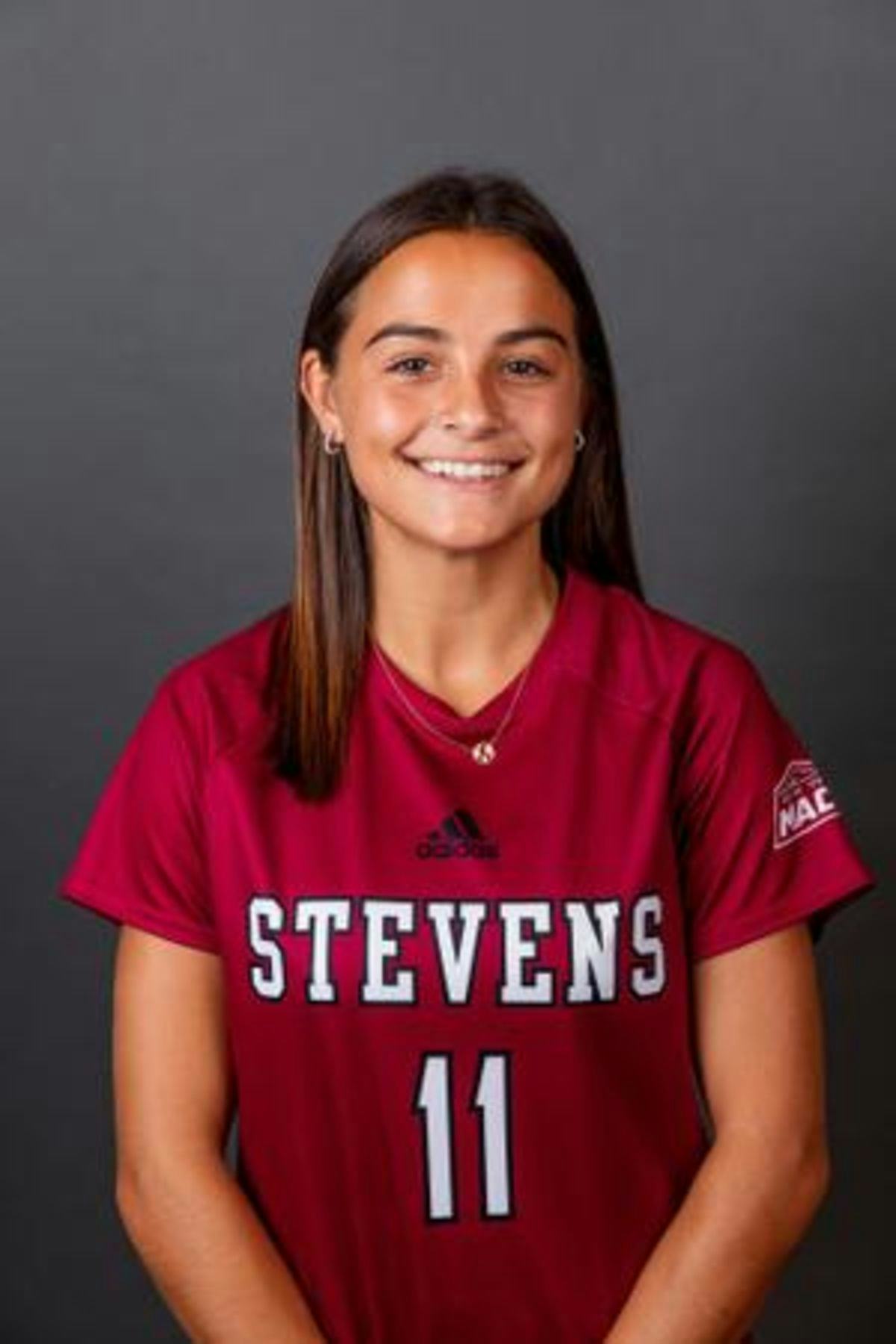Jana Mucci ’24 is Running Toward Her Career Goals and Finding Balance
Jana Mucci ’24, a Pinnacle Scholar and varsity soccer player, presented her research at the North American Congress on Biomechanics (NACOB 2022) in Ottawa
Stevens Institute of Technology biomedical engineering major Jana Mucci ’24, a Pinnacle Scholar and varsity soccer player, presented her research last August, 2022 at the North American Congress on Biomechanics in Ottawa, Ontario.
As part of her research, she investigated the relationships of balance control during two different turning situations: pre-planned vs. late-cued.
In a pre-planned turn, an individual knows they will make a turn. In a late-cued turn, an individual would turn when prompted without any pre-planning.
Mucci wanted to find out which turning situation generated the most angular momentum. In a lab at Stevens, individuals participating in the study walked to an intersection, checked the monitor to their left, and when red was displayed, they knew to continue walking straight. When green was displayed, participants had to suddenly make a turn.
"So, they didn't really know for sure, like in the pre-planned turn, whether or not they were going to turn," Mucci explained.
Mucci used a motion capture system to track their body segments, and then MATLAB, a programming, visualization, and numerical computation platform, which revealed frontal plane angular momentum, a way to measure their dynamic balance during these turns.
Her research demonstrated that her hypothesis was true: that late-cued turns generated more angular momentum.
Understanding body movements as a researcher and athlete
As a forward for the Stevens Ducks women’s soccer team, Mucci can tell you that the path toward a goal is anything but straight.
At any point, she may bolt in one direction to fake a defender, feign passing the ball to a teammate and then accelerate in another direction to ultimately make a goal. These turns and redirections may seem sudden and unexpected, but she had already planned them out in her mind.
At other times, she may take late-cued turns, which describe sudden, unplanned turns. For example, a defender may make an unexpected move, causing Mucci to alter her body’s momentum in reaction.
As an athlete, Mucci understands that sudden changes in direction can have an impact on a person's balance and stability.
As a researcher, she’s interested in the factors contributing to a person's ability to turn and maintain balance while walking or running.
In her research poster, “Segmental Frontal Plane Angular Momentum During Pre-planned and Late-cued Turns,” she wrote, “Understanding more about the relationship between segmental and whole-body angular momenta during different turn contexts could assist future balance training and rehabilitation programs.”
Mucci explained that it’s important to understand how the body responds during these movements in order to prevent injuries and improve performance.
“By analyzing the body segments and movements involved in both pre-planned and late-cued turns, I hope to gain insights that can be applied to the fields of sports training, rehabilitation and injury prevention.”
Reaching a high point in her academic career through mentorship
Like many students, Mucci walked into her first class at Stevens without knowing which major to choose.
“On a whim, I selected engineering management because I figured it would also be good to learn the business side of engineering,” she said.
But Mucci was also a Pinnacle Scholar, which meant she had the opportunity to do research in labs on campus and receive a stipend for it. Her first lab experience was during her freshman year.
“I found myself researching traumatic brain injury,” Mucci said, explaining that the opportunity got her foot in the door to the world of biomedical engineering.
At her next lab experience, she met Assistant Professor of Biomedical Engineering Antonia Zaferiou.
“Jana started in my lab two summers ago, discovered her interest in biomedical engineering and promptly joined our department,” said Zaferiou, who is also the principal investigator at the Musculoskeletal Control and Dynamics Lab, which focuses on understanding and improving human movement mechanics.
Mucci’s path to pursuing biomedical engineering as a career — specifically, biomechanics — started in Zaferiou’s lab, which ultimately led to Mucci presenting at the conference.
Mucci highlighted the opportunity to present her research as a high point in her academic career.
“[Mucci] is an excellent student who is very excited about biomedical engineering, and I've enjoyed watching her grow and develop her skills and confidence," said Zaferiou.
“The fact that Zaferiou is a woman in STEM, and not only that, but also passionate about what she does as a researcher, professor and mentor, drew me into the lab,” said Mucci.
Looking back at her first project in Zaferiou’s lab, Mucci said, “I was just a little, tiny freshman who didn't know much.”
But there she learned about a motion capture system, which records the movement of people and can be used for gait analysis.
“I thought that was really cool,” said Mucci, who got hooked on using the motion capture system to gain locomotive insights. “Soon thereafter, I got up to speed pretty quickly with help from Professor Zaferiou.”
“I’m so thankful for [Zaferiou’s] mentorship and for helping me grow into the person I am today,” said Mucci. “She makes sure she can help as many people as possible along the way, and it's really cool to be around her and in her lab.
Overcoming self-doubt at every turn
Mucci admits that she’s struggled with believing in her capabilities. And this self-doubt often revealed itself while she prepared to present her research at the North American Congress on Biomechanics.
But throughout her academic career, she always found a way to overcome her self-doubt, highlighting how her strong support system — including members from the Stevens community — pushes her forward.
For example, earlier in her academic career, she had an opportunity to participate in an extracurricular biomedical innovation program.
Mucci was hesitant to apply.
Zaferiou, on the other hand, encouraged her.
The opportunity was part of the Mentoring for Innovative Design Solutions (MINDS) Scholars Program, which enables students to collaborate and network with peers and mentors throughout the country. MINDS is an initiative sponsored by Alpha Eta Mu Beta, the national biomedical engineering honor society, of which Mucci is a member.
“I didn't think that I would be able to handle it,” Mucci said.
Not only was Mucci accepted to the program, but once there, she got to work, proposing a research project for a wearable stroke detection system that can detect onset stroke symptoms and automatically call first responders if such symptoms are verified.
The idea for the device originated at a dinner with Mucci’s mother, who’d mentioned that one of her friends had had a stroke.
“We started brainstorming. How could this have been prevented?” Mucci said, noting that inspiration also came from the advanced health and fitness tracking smartwatch she wears on her wrist during training. The device monitors her health, sleep patterns and recovery.
Proudly pointing to the tan lines that the device created on her own wrist while she trained outdoors, Mucci said, “It tracks all this data, and I thought, it would be cool if there was a device that could detect onset stroke symptoms and prevent worse disability outcomes from occurring.”
“It's important because the longer you wait to get someone who experienced a stroke to the hospital, the worse their likely outcome will be, potentially causing permanent damage,” she said.
Her project was ultimately selected as a research area in the MINDS program.
“It's just silly,” said Mucci about her self-doubt, something that has always affected her ever since high school.
While her journey has been anything but straightforward, now in her junior year as a biomedical engineering student with a 4.0 GPA, and with experience under her belt presenting at a national conference, Mucci can be confident in her accomplishments and in her future.




